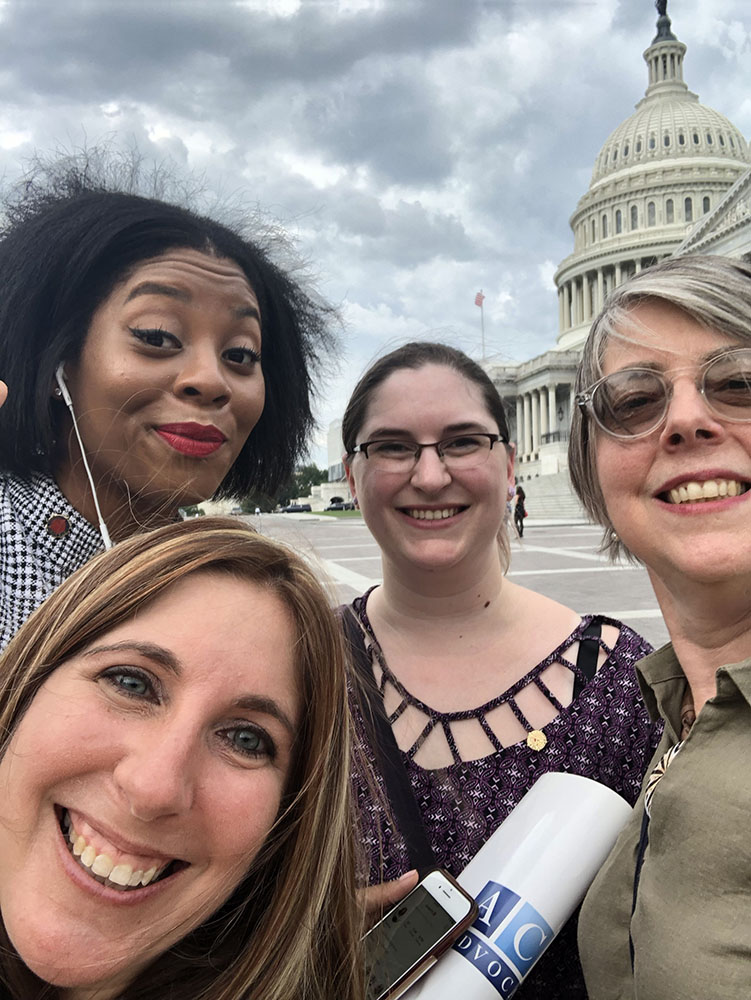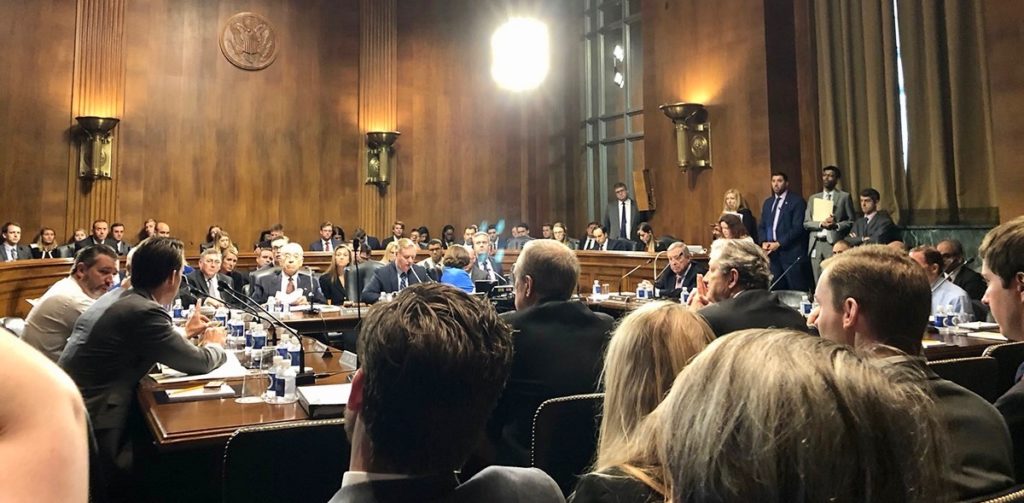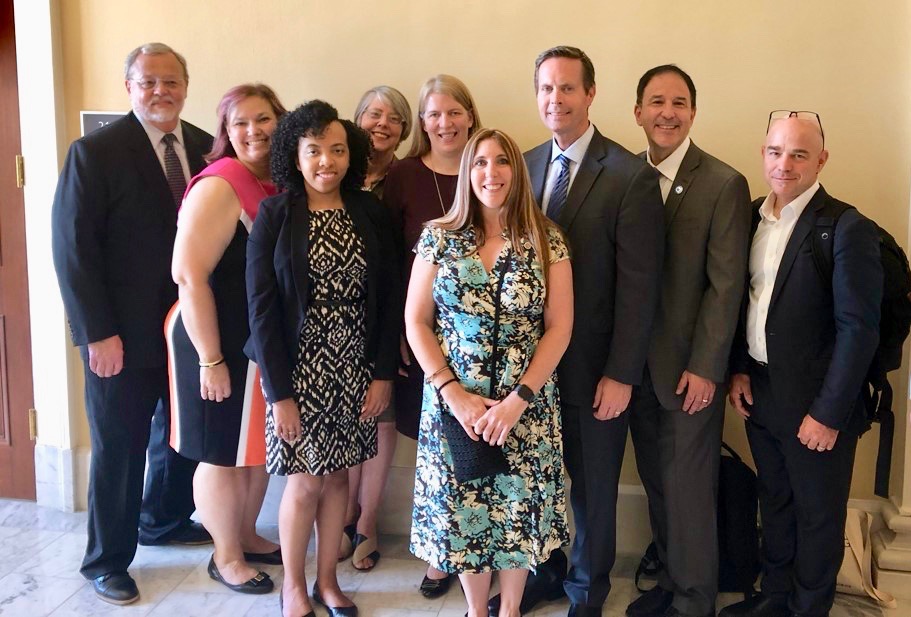24 Jul Lobbying For Artist’s Rights on Capitol Hill
For the past few years, I’ve been on the board of the Graphic Artists Guild as Advocacy Liaison, where I work on issues that affect visual artists, such as copyright and labor practices. One of my favorite activities is joining other artist advocates on Capitol Hill for visits with members of Congress and staffers, educating them on how pending legislation will affect our members. When it became clear about a month ago that the Senate would be marking up S. 1237, The CASE Act – a bill establishing a small copyright claims tribunal – we decided it was important to send as many creators as possible to DC. That meant I finally got to invite other Guild members to join me in the heady, exhausting experience of lobbying on Capitol Hill!
A small copyright claims tribunal is something the Guild had been working towards for over 10 years. Most of our members see their work infringed constantly, costing them licensing opportunities, but pursuing an infringer is costly and difficult, and most lawyers won’t touch small copyright cases. The CASE Act, introduced into the House as HR 3437 and the Senate as 1273, would establish such a copyright tribunal that would only handle small copyright claims. In a nutshell, the small copyright claims tribunal would be similar to a small claims court. It would handle small copyright cases in a process that is inexpensive, easy, and expedited. After so many years of advocating for small copyright claims tribunal, seeing the bill go through markup was beyond exciting, and I was delighted to invite other Guild members to join me.

My call to Guild leadership was answered by a great crew: Yanique DaCosta, Liz DiFiore, and Dawn Mitchell. I couldn’t have asked for better representation from our diverse membership: Yanique is a fine artist, educator, and designer; Liz is a budding children’s book illustrator, and Dawn is a graphic designer. I also recognized what a valuable gift their participation was. As exciting as a lobbying visit to DC sounds, the unvarnished truth is that the four of us, to meet our minimal budget, shared one large hotel room with one small bathroom.
Prepping to Lobby
The Guild crew gathered in DC the afternoon before the meetings were set to begin. That gave us the opportunity to go over the specifics of The CASE Act and plan the key points we wanted to make to Members of Congress. Both Dawn and Yanique have seen their work infringed, so they could make very direct appeals on why The CASE Act mattered so much to them. Liz and I brought the perspective of artist advocates who, as part of our duties, monitor reports of infringement we see across Guild social media. Between the four of us, we felt we had some compelling stories to back our support of The CASE Act. (We also managed to nip over to the National Portrait Gallery to see the Obamas’ portraits and pay homage to the four female Supreme Court Justices – although in 100+° weather, the “nip” was more of a sweaty stroll.)
During the course of the evening, we each received notices of which visits we were scheduled for from the onsite teams from DC-based organizations. As creators from around the country came in – by rough count, there were over 20 representatives from writers’, photographers’, and songwriters’ groups, as well as us – the DC teams made sure we were used to greatest effectiveness.
15 Representatives, Three Senators, and One Markup in Two Days
The goal of the trip was to meet with Members of Congress before the Senate Judiciary Committee voted on the markup of The CASE Act on Thursday, July 19. Wednesday was spent galloping from office to office, meeting with Congressional staff or Members of Congress. With a wide range of creators participating in each team, the meetings were an education on the scale of infringement, and the toll it takes in different creative industries. It was a tiring but exciting day, involving a lot of trekking between the different House and Senate Office Buildings. (We even got to experience a rare trip on the Capitol subway. It’s usually reserved for Congressional staff, but with the temperature approaching 110°, and with a last-minute meeting necessitating rushing the few blocks from the House to the Senate office buildings, one staffer took pity on us and got us onto the subway.)
When I went on my first few lobbying trips, I was so shy and tongue-tied I found it difficult to speak. So I was gratified to hear that the Guild crew didn’t have the same problems I did. From the photos cropping up on social media – Liz hobnobbing with a Representative over a mutual love for a children’s book character, Yanique chatting with her Senator, Dawn thanking a Representative from her home state – it was clear the meetings were going well. I found out how well the next morning when I saw Copyright Alliance Executive Director Keith Kupferschmidt at breakfast. Instead of saying hello, he greeted me by demanding, “Where is Liz? Is Liz here?” As it turned out, one of the senior executives at the Chamber of Commerce had been following #TheCASEAct on social media, was captivated by Liz’s posts, and wanted to meet her in person.
Hearing (and Seeing!) the Hearing
Thursday was dominated by the Senate Judiciary Committee markup hearing on the CASE Act. The hearing was an opportunity for the Senators on the Committee to mull over the Bill, ask for any changes, and then vote on whether or not to pass the Bill for consideration by the full Senate. A markup hearing on a Bill is the first major hurdle to cross, and we were disappointed to discover that there were no seats available in the Committee room. The large queue of creators who had gathered to attend the hearing began to dwindle, and we hopefully skooched up in line. That strategy paid off; as the hearing got underway, three of us were invited into the room.

The hearing itself was an interesting glimpse at how the Senate operates. The members of the Committee sat in an open ring of tables in the center of the room, facing each other, and observers occupied the rows of chairs on the perimeter of the room. Senators arrived while the meeting was underway, rushing in to be present for any votes as the cordial discussion of the different bills was in progress. It was gratifying to hear Senator John Kennedy (R-LA) introduce the bill and describe how vital it is to creators; what we didn’t expect was that Senators Feinstein (D-CA), Leahy (D-VA), Cruz (R-TX), and Blumenthal (D-CT) asked on the spot to be listed as co-sponsors of the Bill. The CASE Act passed the Committee by voice vote, with no objections.
Out in the hallway, the excitement was palpable. Many of the creators’ associations had been working on some form of small copyright claims legislation for many years, and this was the first time a copyrights small claims bill had ever been voted out of committee. Senator John Kennedy joined us in the hallway, where we thanked each other – he thanking us for our advocacy work on the Bill, and we thanking him for introducing the Bill into the Senate. (Senator Kennedy also complimented Yanique on her sparkly sneakers.) The day was capped off by more meetings with Members of Congress, with teams of creators scattering to visit different offices, and gathering on breaks to compare notes.
Next Steps: Keeping the Grassroots Green
While our whirlwind trip was largely successful, after we got home, we started hearing reports that opponents to The CASE Act had started an astroturf campaign (a fake grassroots campaign backed by deep pockets rather than true grassroots community groups) that is spreading false rumors about the Act across the social media. So we’re back to the grind of organizing true grassroots support for the Bill: asking our members and followers to contact their Members of Congress, writing and publishing articles in support, posting information on social media, and writing letters of thanks to the Members of Congress who have come out to co-sponsor the Bills. We’re in a lopsided fight; the opposition is fueled by big tech and the Internet giants, and they have money to burn. But we’re hopeful that after so many years of hard work, and with Congress finally paying attention, a copyright small claims tribunal will become a reality.
If you’d like to support The CASE Act, go to copyrightdefense.com. From there, you can enter your information and have emails go out to your local Senators and Representatives.
Rebecca’s headshot is by the amazing Caroline Kessler.





